Introduction:
Did you know that the recent fuel price increases have placed immense pressure on Nigerian businesses? The impact of fuel prices and scarcity has created a daunting landscape for entrepreneurs, testing their innovation and resilience. But hey, let’s not lose hope!
In times of adversity, there are opportunities to show off our innovation and resilience. In the face of adversity lies an opportunity to rise above these challenges and not just survive, but thrive.
In this blog post, we’ll explore five strategic measures that can help Nigerian businesses navigate the fuel price crisis and remain strong amidst uncertainty.
- Embrace Remote Work and Flexibility:
Data from a recent study by the Nigerian Business Council reveals that businesses adopting remote work and flexible hours experienced an impressive 25% reduction in monthly fuel expenses.
For instance, Xlydone Solutions, a tech startup in Lagos, implemented remote work policies, allowing their team to work from home three days a week. As a result, they reported a significant 30% decrease in overall operational costs, enabling them to weather the fuel price storm while keeping their employees motivated and engaged. Plus, remote work improves work-life balance, boosts productivity, and keeps the team motivated and engaged. So you see, it’s like killing three birds with one stone.
- Optimize Supply Chain and Logistics:
We all know how fuel scarcity can hit transportation and logistics hard for businesses heavily dependent on moving goods.
So, let’s get strategic! Companies should analyze their supply chains and find areas for optimization. That could mean looking into local sourcing options, negotiating better shipping rates, and using efficient inventory management systems.
Case in point, DEF Manufacturing, a well-established company in Abuja, successfully optimized its supply chain amidst fuel scarcity. By sourcing locally and renegotiating shipping rates, they managed to reduce transportation costs by 15%. Implementing efficient inventory management further resulted in a 10% increase in cost savings, providing them with a competitive edge and smoother sailing during periods of fuel price fluctuations.
- Embrace Renewable Energy Solutions:
Here’s an idea: why not take advantage of renewable energy to power operations? As fuel prices keep soaring, investing in solar panels, biomass, or wind energy can significantly reduce dependency on traditional fuel sources and lead to long-term cost savings. Not only will this show off the company’s commitment to sustainability, but it’ll also shield the business from the ups and downs of fuel prices.
Statistics from the Nigerian Renewable Energy Agency indicate that businesses investing in renewable energy solutions have witnessed an average of 40% reduction in fuel consumption. Take, for example, Kish Onyenwe Retailers, a prominent retail chain, which installed solar panels in its stores. This move led to a substantial decrease in their reliance on traditional fuels, saving them an estimated Naira 1.5 million annually and reinforcing their commitment to sustainability.
- Implement Cost-Effective Technologies:
Tech to the rescue! Businesses struggling with fuel price scarcity can incorporate cost-effective technologies to make a real difference. Think about energy-efficient equipment, automated processes, and smart energy management systems.
These technologies can optimize energy consumption, cut down fuel usage, and reduce operational costs, making the business more resilient in the face of fuel price fluctuations.
- Offer Value-Added Services and Loyalty Programs:
Customer loyalty is gold, especially during uncertain economic times. Here’s a sweet way to retain and attract customers: offer value-added services and loyalty programs. Free delivery, discounts, or exclusive benefits for loyal customers can do wonders. By providing top-notch customer experiences and rewarding loyalty, businesses can keep a strong customer base, even during fuel price challenges.
Conclusion:
Yes, fuel prices and scarcity are serious challenges for Nigerian businesses. But remember, it’s not the end of the world! We’ve got the spirit of resilience and adaptability in us, and we can use that to turn these challenges into opportunities for growth and innovation.
With strategic planning and a customer-centric approach, businesses can overcome fuel price scarcity and emerge stronger and more successful on the other side. Let’s navigate these uncertain waters together and build a brighter future for businesses in Nigeria. We’ve got this!
Are you looking to efficiently monitor your fuel usage and save costs? Check out Concept Nova Fuel Control System.

